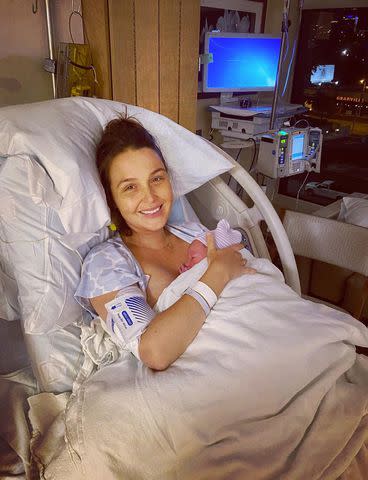'Grey's Anatomy' Star Camilla Luddington Says That Premenstrual Dysphoric Disorder Is Like 'PMS on Crack’
The mom of two says that she can feel herself “sinking into a depression” before her period starts

Tommaso Boddi/WireImage
Camilla Luddington, here in February 2024, shares details of her PMDD on her podcast, 'Call It What It Is'Camilla Luddington shared the symptoms of her ongoing struggle with premenstrual dysphoric disorder (PMDD), which she was diagnosed with after giving birth to son Lucas during the summer of 2020.
Luddingon, who shares Lucas, and daughter Hayden, 7, with her husband, 13 Reasons Why actor Matthew Alan, discussed her symptoms on a recent episode of Call It What It Is, the podcast she co-hosts with Grey’s Anatomy co-star Jessica Capshaw.
“It was, let's be honest, an absolute s—t show, right,” Luddington said about the experience of giving birth during the Covid pandemic lockdown.
“And I thought, ‘I've given birth in a, you know, extraordinary, crazy time, and that that's where all these feelings are coming from.’ “

Stephane Cardinale - Corbis/Corbis via Getty
'Call It What It Is' podcast co-hosts Jessica Capshaw (left) and Camilla Luddington, here in June 2024.The PEOPLE Puzzler crossword is here! How quickly can you solve it? Play now!
Luddington shared that she continued to have emotional swings — even after the pandemic — whenever she was due to get her period.
“I started to notice this pattern before my period started,” Luddington, 40, said.
“I felt like I had PMS, but I could actively feel myself kind of sinking into a depression.”
That’s when she says she was diagnosed with PMDD, which she describes as “basically PMS on crack.”
PMDD “is a much more severe form of PMS,” Johns Hopkins Medicine explains, calling it a “severe and chronic health condition that needs attention and treatment.”
Related: Dixie D’Amelio Describes Her Premenstrual Dysmorphic Disorder Symptoms: ‘Losing the Will to Live’
Symptoms, which start a few days before the onset of the menstrual cycle and last until its completion, include “depressed mood, sadness, hopelessness, or feelings of worthlessness,” along with increased anxiety and irritability.
There are physical symptoms as well, like “breast swelling or tenderness, headaches, joint or muscle aches, weight gain, and bloating” — and those with PMDD may experience disruptions to their sleeping habits and appetite.
Luddington told Capshaw that, before her period starts, “I can feel myself slipping into like a depression.”

Camilla Luddington/instagram
Camilla Luddington announces the birth of her son Lucas during the Covid pandemic of 2020.“I didn't understand what was happening, and then I would come out of it and I was like, ‘What is going on?’ “
She said that just a couple of says ago, she felt like “Something's really wrong. I feel like something's wrong and I'm really sad.”
Never miss a story — sign up for PEOPLE's free daily newsletter to stay up-to-date on the best of what PEOPLE has to offer, from celebrity news to compelling human interest stories.
When she realized she was due for her period, she realized, ‘Oh my God, this is the time when I'm starting to get this again.’ “
“So that's where I'm at currently.”
However, Luddington added that knowing there’s a name for her disorder is “kind of helpful.”
“[I] know that I'm going to come out of that. Now that it's been named for me, I can be okay. I'm gonna feel better. But it is still hard every month, feeling like ‘Damn it, here I am again.’ “
For more People news, make sure to sign up for our newsletter!
Read the original article on People.
